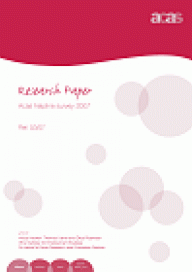Publications
 We author and publish a range of resources to keep you up to date with the latest developments in employment, labour market and human resource policy and practice.
We author and publish a range of resources to keep you up to date with the latest developments in employment, labour market and human resource policy and practice.
All our pdf publications are free to access.
-
📄
Management and Leadership
Tamkin P | Nov 2007 | Institute for Employment StudiesUK managers have been accused of being under-skilled and underperforming, paralysing organisations through their incompetence. This opinion paper argues that if there is a problem with managers, it might be sensible for organisations to look long and hard at themselves first.
-

Building on Young Apprenticeships
Equal Opportunities
Newton B, Miller L, Page R, Tuohy S | Oct 2007 | Institute for Employment StudiesThe Department for Children, Schools and Families commissioned this report to support the implementation of the recommendations made within the earlier research, 'Young Apprenticeships: Equal Opportunities'. This report: illustrates how to produce careers and training information to promote Young Apprenticeships (YA) to atypical entrants in three strongly gender-segregated sectors; demonstrates how to encourage wider choices and provide practical information, advice and guidance (IAG) through the provision of taster sessions during YA recruitment; and identifies examples of good equalities practice within YA delivery through progress-update visits to the five original case study areas.
-

The Changing HR Function: Transforming HR?
Reilly P, Tamkin P, Broughton A | Oct 2007 | Chartered Institute for Personnel and DevelopmentThis research report describes the evolution and current state of the HR function, and provides practical guidance for organisations on how best to structure and staff the function to achieve future success. It is the final stage of a larger project within the CIPD's research programme on the HR function, and its particular focus is on the impact of HR transformation.
-
📄
Incentives and Barriers to Training in the Electrotechnical Industry
Miller L | Oct 2007 | Electrical Contractors AssociationIn order to inform its training and qualification policies and strategy for the industry, the Electrical Contractors' Association (ECA) commissioned IES to gain an understanding of the training culture that exists within the electrical installation sector. A postal survey was used to gain up-to-date information regarding training practice and attitudes towards training. The report draws conclusions regarding the survey and makes recommendations to the ECA. This publication is no longer available.
-
📄
An Introduction to Strengths at Work
Fairhurst P | Oct 2007 | Institute for Employment StudiesIn many organisations, development is based on identifying where people could do better, their 'gaps' and areas of poor performance, and trying to fix these. Much less time is spent on what people already do well and what energises them, and using these as a basis for developing high performance. This opinion paper explains how switching the focus to what works and what people's strengths are, leads to much higher energy levels and ultimately to better performance.
-

What Works at Work?
Review of evidence assessing the effectiveness of workplace interventions to prevent and manage common health problems
Hill D, Lucy D, Tyers C, James L | Oct 2007 | Health Work WellbeingThis report gathers together top quality international evidence on the effectiveness of workplace interventions to prevent and manage common health problems. With a focus on the three main health problems affecting the working age population in the UK, it highlights what has been proved effective whilst also identifying areas requiring more research.
-

IES Annual Review 2007
Sep 2007 | Institute for Employment StudiesIES Annual Review 2007
-

Engagement: The Continuing Story
Robinson D, Hooker H, Hayday S | Sep 2007 | Institute for Employment StudiesOur first research report, The Drivers of Employee Engagement, led to a definition of engagement, an engagement measure to be used within attitude surveys, and a diagnostic tool to identify the drivers of engagement. This deeper investigation tests our engagement measure and drivers tool in different settings and sectors.
-

Acas Helpline Survey 2007
Hooker H, Usher T, Robinson D | Sep 2007 | Advisory, Conciliation and Arbitration Service (Acas)The Acas national telephone helpline service provides advice on employment relations issues to employers, employees and their representatives, dealing with approximately 850,000 calls each year across 12 regional offices. This research presents the findings of the 2007 Acas Helpline Survey.
-
📄
Workplace Health Connect: July 2007 Progress Report
Tyers C, Lucy D, Sinclair A, Wilson S | Sep 2007 | Health and Safety ExecutiveWorkplace Health Connect (WHC) was a free service providing small and medium-sized enterprises with advice on workplace health and safety. This is the third IES progress report. The main message in this third report is that the service continues to receive a positive response from employers. This publication is no longer available.
